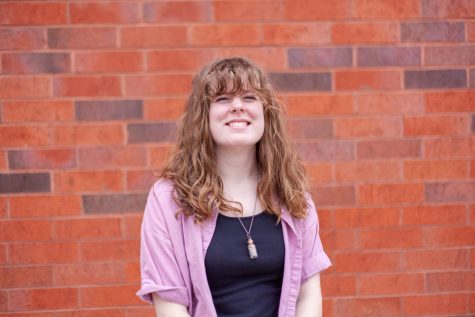Latinx History Month: Gerardo Licón
UWEC professor named on list of ‘Wisconsin’s 34 most powerful Latinos’
Photo by Submitted Photo
Gerardo Licón walks in a parade with other members of El Centro de Conexión de Chippewa Valley during the International Fall Festival in 2018.
As a high school student living in the suburbs of Los Angeles, Gerardo Licón noticed a lack of education regarding Latinx history in his classes, despite attending a school whose student demographic was made up of roughly 50 percent Latinx students.
“I remember looking forward to the Spanish-American War because I thought that might say something,” Licón said. “And when we got to it all it said, it was a very short paragraph that said the U.S. won the war with two cannon shots. And that was it. That was it.”
Licón, a UW-Eau Claire professor of history and Latin American studies, initially began college with the intent to study business, but found after working for a bank for a few years that his passion truly lies in studying Latinx history.
After coming to UW-Eau Claire for a two year visiting position, Licón was hired as an assistant professor in the Latin American studies program in 2011. Currently, he is working on a book, titled “Pachucas, Pachucos, and Their Culture.”
Pachucos are Mexican-American Zoot Suiters—or people who wore zoot suits, which is a style of dress that was popular in the 1940s during World War II. Most of what has been written on this topic, Licón said, has been written about Los Angeles during 1942 and 1943 during The Sleepy Lagoon case and the zoot suit riots. Licón’s book expands the research geographically and chronologically.
“Historians believe that history is about change over time,” Licón said. “And so then my argument is that if we’re just looking at one time in place, it’s like getting a snapshot instead of a richer history that includes change over time as opposed to a snapshot of one single time in place.”
Melissa Parra-Huizar, a second-year Latin American studies and international business student, has had Licón as a professor in two of her classes. After attending her courses and Licón’s office hours, she said his lessons have helped her open her mind and see things differently.
“He taught me how impactful Latin American classes can be,” Parra-Huizar said. “As a Latina, it’s very impactful. I thought that I knew the history, but no, there’s so much more to it.”
In addition to working at UW-Eau Claire, Licón has been involved with El Centro de Conexión de Chippewa Valley, a local nonprofit organization, since its founding in 2010. At first he was a board member, Licón said, before serving as its president until 2018. Currently, he is no longer on the board but remains an active volunteer within the organization.
El Centro de Conexión de Chippewa Valley is a volunteer run organization whose mission, according to its website, is to create a safe and inclusive community of diverse cultures through working to meet Latinx family needs, bringing awareness to policy issues, assisting in translation and planning community celebrations. They are made up of a network of 300 or so volunteers.
“They work toward creating the best relationship possible between the growing Latino community and the Chippewa Valley,” Licón said, “they do that and they do advocacy, and help people with whatever they can.”
Rebecca Denney, a former president of the organization and current board member, said Licón was like the glue of the organization for much of the time he was on the board and put his all into each of the projects he worked on.
“He has always taken on a lot of things by himself without even consulting other volunteers because he feels that he is able to do it,” Denney said. “He has done so much, whether it’s personally going to someone’s house and helping them translate and read documents or speaking at rallies when no one else was able to, or showing up to things when no one else was able to.”
Licón’s work ethic is evident not only in his work with El Centro de Conexión de Chippewa Valley, Denney said, but also in his personal life.
“He is first and foremost a historian, a husband and a father,” Denney said. “Everything that he does is because of his own work ethic and that comes from his parents. He just is this person who—to say that he has an amazing work ethic is the understatement of the century. He deserves every honor given to him and more.”
Licón’s work at UW-Eau Claire and his involvement with El Centro de Conexión de Chippewa Valley was recently highlighted in Madison 365’s list of “Wisconsin’s 34 most powerful Latinos.” At first, Licón said he was a little uncomfortable with the title, he said, but understood it better after reading the organization’s explanation of the list.
“They say this is a list of influential Latinos who are good role models, you know, trying to create change in their communities,” Licón said. “And so, you know, I can relate more to that than the title of most powerful Latinos. I don’t think I have much power beyond the power that we all have to do our part, do our share.”
Catherine Emmanuelle, the first Latina to serve on the Eau Claire City Council, was also named on the list. Emmanuelle currently represents over 66,000 people, according to her Facebook page, as an at-large member on the Eau Claire City Council. In 2017 she received the 2017 Outstanding Recent Alumnus Award from UW-Eau Claire.
Kopke can be reached at [email protected].

Lea Kopke is a fourth-year journalism and German student. This is her seventh semester on The Spectator staff. She plays the clarinet in the Blugold Marching Band and recently relearned how to ride a bike with no hands.











